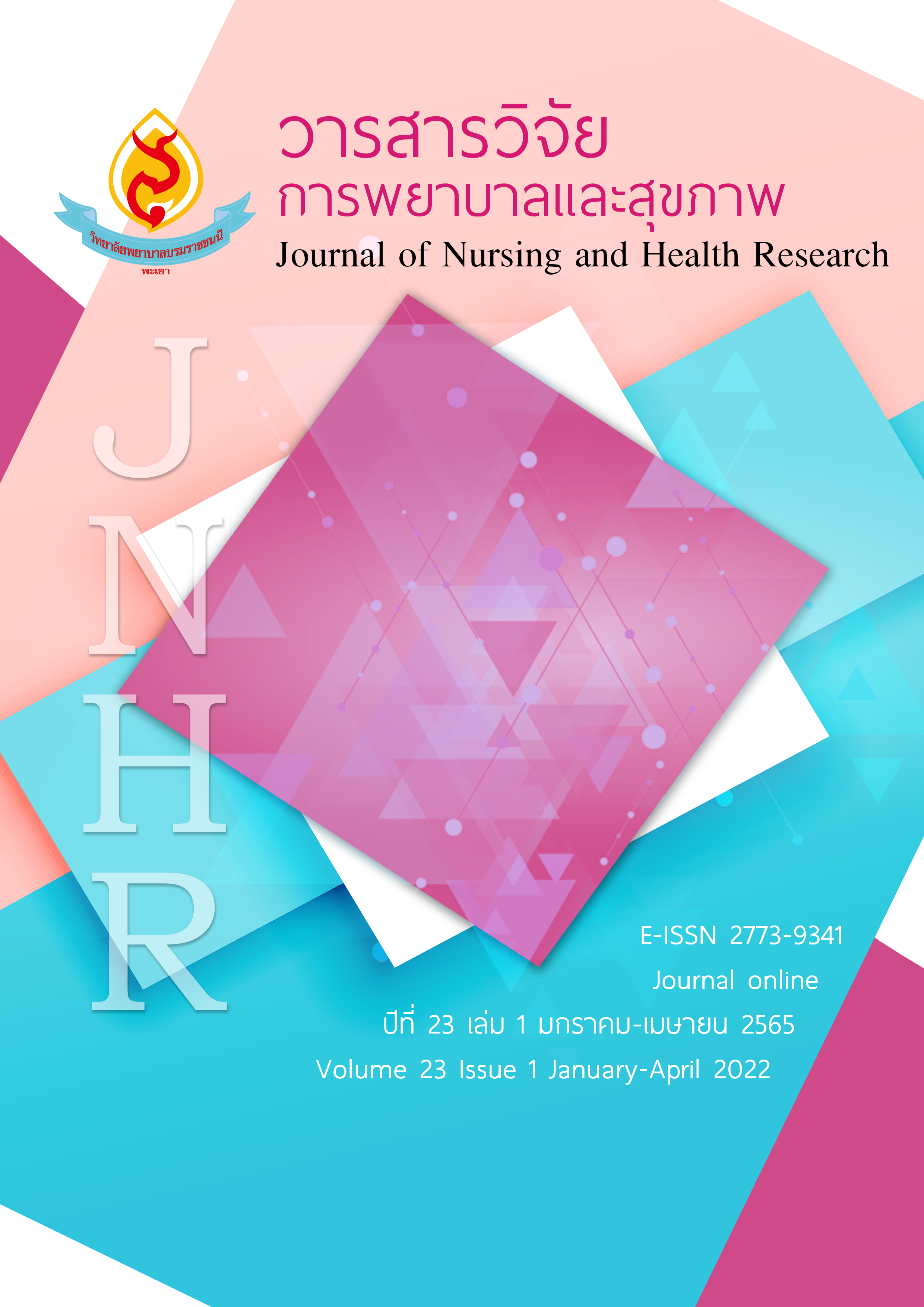ผลการจัดการเรียนรู้ด้วยสถานการณ์จำลองเสมือนจริง ต่อความรู้ การตัดสินใจทางคลินิกและ ทักษะการปฏิบัติการพยาบาลในการดูแลผู้ป่วยที่มีภาวะกล้ามเนื้อหัวใจขาดเลือดเฉียบพลัน ระยะวิกฤติ: กรณีศึกษา
คำสำคัญ:
ความรู้, การตัดสินใจทางคลินิก, ทักษะการปฏิบัติการพยาบาล, การจัดการเรียนรู้ด้วยสถานการณ์จำลอง เสมือนจริงบทคัดย่อ
การศึกษานี้ ใช้รูปแบบการวิจัยแบบกึ่งทดลอง (quasi – experimental research) แบบกลุ่มเดียววัดผลก่อน-หลัง (one group pretest-posttest design) เพื่อศึกษาผลของการจัดการเรียนรู้ด้วยสถานการณ์จำลองเสมือนจริง(simulation based learning: SBL) ที่มีผลต่อความรู้ การตัดสินใจทางคลินิก และทักษะการปฏิบัติการพยาบาลในการดูแลผู้ป่วยที่มีภาวะกล้ามเนื้อหัวใจขาดเลือดเฉียบพลันระยะวิกฤติของนักศึกษาพยาบาลศาสตรบัณฑิต ชั้นปีที่ 3 กลุ่มตัวอย่างจำนวน 37 คน ประเมินผลลัพธ์การเรียนรู้แบบ SBL โดยวัดความรู้ก่อน และหลังการเรียนรู้ และประเมินการตัดสินใจทางคลินิก และทักษะการปฏิบัติการพยาบาลหลังการเรียนรู้ วิเคราะห์เปรียบเทียบก่อนและหลังด้านความรู้โดยใช้สถิติ paired t-test วิเคราะห์คะแนนการตัดสินใจทางคลินิก และทักษะการปฏิบัติการพยาบาล หลังการเรียนรู้ด้วย SBL โดยการแจกแจงความถี่ ค่าเฉลี่ย ร้อยละ และ ส่วนเบี่ยงเบนมาตรฐาน ผลการวิจัยพบว่า กลุ่มตัวอย่างที่ได้รับการจัดการเรียนรู้ด้วย SBL มีคะแนนความรู้เพิ่มขึ้นอย่างมีนัยสำคัญทางสถิติ (p < 0.05) คะแนนการตัดสินใจทางคลินิกผ่านเกณฑ์จำนวน 30 คน (ร้อยละ 81.10) กลุ่มตัวอย่าง 27 คน (ร้อยละ 71.13) มีคะแนนทักษะการปฏิบัติการพยาบาลในภาพรวมผ่านเกณฑ์ และความพึงพอใจอยู่ในระดับดี (X=4.36, SD.= 0.70) มีข้อเสนอแนะว่า ควรมีการจัดการเรียนการสอนแบบ SBL เพื่อพัฒนาความรู้ของนักศึกษาพยาบาล นอกจากนี้ควรมีการวิจัยแบบทดลองซ้ำเพื่อประเมินผลลัพธ์ด้านทักษะการตัดสินใจในคลินิก และทักษะการปฏิบัติการพยาบาล
เอกสารอ้างอิง
พนารัตน์ วิศวเทพนิมิต, อุบล สุทธิเนียม และจันทร์จิรา เกียรติสี่สกุล. (2562). ผลการใช้รูปแบบการเรียนรู้โดยใช้สถานการณ์เสมือนจริงในการเตรียมความพร้อมก่อนการฝึกปฏิบัติการพยาบาลผู้ป่วยที่มีภาวะหัวใจล้มเหลว ต่อความพึงพอใจและความมั่นใจในตนเองในการเรียนของนักศึกษาพยาบาลศาสตร์ชั้นปีที่ 3 วิทยาลัยพยาบาลบรมราชชนนี กรุงเทพ. วารสารวิจัยสุขภาพและการพยาบาล, 35(2), 224-234.
มาลินี บุญเกิด, ฤทัยรัตน์ มั่งอะนะ, และสุกัญญา กระเบียด. (2558). ผลของการจัดการเรียนการสอนโดยใช้สถานการณ์เสมือนจริงต่อความมั่นใจและทักษะในการดูแลผู้ป่วยวิกฤติ. สืบค้นเมื่อ 25 กุมภาพันธ์ 2565, จากhttps:// administer.pi.ac.th/uploads/eresearcher/upload_doc/2015/proceeding/1444373072220903004511.pdf.
วงเดือน สุวรรณคีรี, อรพิน จุลมุสิ, และฐิติอาภา ตั้งค้าวานิช. (2559). การจัดการเรียนรู้โดยใช้สถานการณ์จำลองสำหรับนิสิตพยาบาล. วารสารพยาบาลศาสตร์ จุฬาลงกรณ์มหาวิทยาลัย, 28(2), 1-14.
วรรวิษา สำราญเนตร, และนิตยา กออิสรานุภาพ. (2562). ความพึงพอใจในการจัดการเรียนการสอนแบบใช้สถานการณ์จำลองในการพยาบาลผู้ป่วยที่มีภาวะช็อคของนักศึกษาพยาบาลวิทยาลัยพยาบาลศรีมหาสารคาม. วารสาร โรงพยาบาลสกลนคร, 22(1), 64-75.
วิทยาลัยพยาบาลบรมราชชนนี จักรีรัช. (2562). รายงานการประเมินระดับความพึงพอใจของผู้ใช้บัณฑิตต่อคุณภาพนักศึกษา และพฤติกรรมการบริการสุขภาพด้วยหัวใจความเป็นมนุษย์ของนักศึกษาปีสุดท้าย/บัณฑิต วพบ.จักรีรัช ปีการศึกษา 2562. ราชบุรี. วิทยาลัยพยาบาลบรมราชชนนี จักรีรัช
ศุภลักษณ์ ธนาโรจน์. (2560). การสอนโดยการจำลองสถานการณ์เสมือนจริงในรายวิชาปฏิบัติหลักการและเทคนิคการพยาบาล. วารสารวิทยาลัยพยาบาลบรมราชชนนี อุตรดิตถ์, 9(2), 70-84.
สมาคมแพทย์โรคหัวใจแห่งประเทศไทย ในพระบรมราชูปถัมภ์. (2563). แนวเวชปฏิบัติการดูแลรักษาผู้ป่วยภาวะหัวใจขาดเลือดเฉียบพลัน พ.ศ. 2563. (พิมพ์ครั้งที่ 1). สมุทรปราการ: เนคสเตป ดีไซน์.
สืบตระกูล ตันตลานุกูล, สุวัฒน์ รัตนศักดิ์, ชมพูนุช แสงพานิช, วิภาวรรณ สีสังข์, และ ฐิติอาภา ตั้งค้าวานิช. (2559). ผลของการจัดการเรียนการสอนโดยใช้สถานการณ์จำลองต่อการพัฒนาความสามารถในการปฏิบัติการรักษาพยาบาลเบื้องต้นของนักศึกษาพยาบาล วิทยาลัยพยาบาลบรมราชชนนี อุตรดิตถ์. วารสารวิทยาลัยพยาบาลบรมราชชนนี อุตรดิตถ์. 8(1), 49-58.
สมจิตต์ สินธุชัย และกันยารัตน์ อุบลวรรณ. (2560). การเรียนรู้โดยใช้สถานการณ์จำลองเสมือนจริง:การนำไปใช้ในการจัดการเรียนการสอน. วารสารพยาบาลทหารบก, 18(1), 29-38.
สมจิตต์ สินธุชัย, กันยารัตน์ อุบลวรรณ, ณัฐวุฒิ บุญสนธิ, ปริญญา ยอดอาษา, และภูมินทร์ ดวงสุริยะ. (2562). ผลของการจัดการเรียนรู้โดยใช้สถานการณ์จำลองเสมือนจริงสูงต่อความสามารถในการตัดสินใจทาง คลินิกของนักศึกษาพยาบาล. วารสารพยาบาลตำรวจ, 11(1), 172-183.
Cook, D. J., Webb, S., & Proudfoot, A. (2022). Assessment and management of cardiovascular disease in the intensive care unit. Heart, 108(5), 397-405. doi: 10.1136/heartjnl-2019-315568.
Haukedal, T. A., Reierson, I. Å., Hedeman, H., & Bjørk, I. T. (2018). The impact of a new pedagogical intervention on nursing students' knowledge acquisition in simulation-based learning: A quasi-experimental study. Nursing Research and Practice, 2018, 7437386-7437386. doi: 10.1155/ 2018/7437386.
Jeffries, P. R., Rodgers, B., & Adamson, K. (2015). NLN Jeffries simulation theory: brief narrative description. Nursing Education Perspectives, 36(5), 292-293.
Lasater, K. (2007). Clinical judgment development: using simulation to create an assessment rubric. The Journal of Nursing Education, 46(11), 496–503. doi: 10.3928/01484834-20071101-04.
Lee, B. O., Liang, H. F., Chu, T. P., & Hung, C. C. (2019). Effects of simulation-based learning on nursing student competences and clinical performance. Nurse Education in Practice, 41, 102646. doi:https://doi.org/10.1016/j.nepr.2019.102646.
Letcher, D. C., Roth, S. J., & Varenhorst, L. J. (2017). Simulation-based learning: improving knowledge and clinical judgment within the NICU. Clinical Simulation in Nursing, 13(6), 284-290. doi:https://doi.org/10.1016/j.ecns.2017.03.001.
Modic, M. B. (2013). Tanner’s model of clinical judgment applied topPreceptorship: part 1. Journal for Nurses in Professional Development, 29(5), 274-275. doi: 10.1097/01.NND.0000433907.85137.2e.
Rahajeng, I.M., & Muslimah, F. (2019). The application of clinical judgment and decision making of critical care nurse in intensive care units (ICUs). International Journal of Nursing and Health Services (IJNHS), 2(1), 1-14.
Torkshavand, G., Khatiban, M., & Soltanian, A. R. (2020). Simulation-based learning to enhance students’ knowledge and skills in educating older patients. Nurse Education in Practice, 42, 102-678. doi: https://doi.org/10.1016/j.nepr.2019.102678.
Yuan, H. B., Williams, B. A., & Man, C. Y. (2014). Nursing students’ clinical judgment in high-fidelity simulation-based learning: a quasi-experimental study. Journal of Nursing Education and Practice. 4(5), 7-15.
ดาวน์โหลด
เผยแพร่แล้ว
รูปแบบการอ้างอิง
ฉบับ
ประเภทบทความ
สัญญาอนุญาต
ลิขสิทธิ์ (c) 2022 วารสารวิจัยการพยาบาลและสุขภาพ

อนุญาตภายใต้เงื่อนไข Creative Commons Attribution-NonCommercial-NoDerivatives 4.0 International License.



